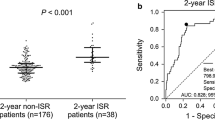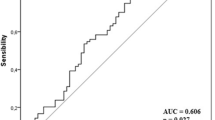Abstract
Acute coronary syndrome (ACS) is the leading cause of death in elderly patients worldwide. Due its participation in apoptosis, fibrosis, and angiogenesis, transforming growth factor-β (TGF-β) isoforms had been categorized as risk factors for cardiovascular diseases. However, due their contradictory activities, a cardioprotective role has been suggested. The aim was to measure the plasma levels of TGF-β1, 2, and 3 proteins in patients with ACS. This was a case–control study including 225 subjects. The three activated isoforms were measured in serum using the Bio-Plex Pro TGF-β assay by means of magnetic beads; the fluorescence intensity of reporter signal was read in a Bio-Plex Magpix instrument. We observed a significant reduction of the three activated isoforms of TGF-β in patients with ACS. The three TGF-β isoforms were positively correlated with each other in moderate-to-strong manner. TGFβ-2 was inversely correlated with glucose and low-density lipoprotein (LDL)-cholesterol, whereas TGF-β3 was inversely correlated with the serum cholesterol concentration. The production of TGF-β1, TGF-β2, and TGF-β3 are decreased in the serum of patients with ACS. Further follow-up controlled studies with a larger sample size are needed, in order to test whether TGF-β isoforms could be useful as biomarkers that complement the diagnosis of ACS.
Similar content being viewed by others
References
Kumar, A., & Cannon, C. P. (2009). Acute coronary syndromes: diagnosis and management, part I. Mayo Clinic Proceedings Mayo Clinic, 84, 917–938.
Nagesh, C. M., & Roy, A. (2010). Role of biomarkers in risk stratification of acute coronary syndrome. The Indian Journal of Medical Research, 132, 627–633.
Kamath, D. Y., Xavier, D., Sigamani, A., & Pais, P. (2015). High sensitivity C-reactive protein (hsCRP) & cardiovascular disease: an Indian perspective. The Indian Journal of Medical Research, 142, 261–268.
Letterio, J. J., & Roberts, A. B. (1998). Regulation of immune responses by TGF-beta. Annual Review of Immunology, 16, 137–161.
Heldin C.-H., Moustakas A. (2016) Signaling receptors for TGF-β family members. Cold Spring Harbor Perspectives in Biology, 8, 22–53.
Accornero, F., van Berlo, J. H., Correll, R. N., Elrod, J. W., Sargent, M. A., & York, A., et al. (2015). Genetic analysis of connective tissue growth factor as an effector of transforming growth factor β signaling and cardiac remodeling. Molecular and Cellular Biology, 35, 2154–2164.
Pardali, E., Goumans, M.-J., & ten Dijke, P. (2010). Signaling by members of the TGF-beta family in vascular morphogenesis and disease. Trends in Cell Biology, 20, 556–567.
Kinlay, S., & Ganz, P. (2000). Relation between endothelial dysfunction and the acute coronary syndrome: implications for therapy. The American Journal of Cardiology, 86, 10J–13J. discussion 13J-14J.
Jiang, J., Zhang, Y., Peng, K., Wang, Q., Hong, X., & Li, H., et al. (2017). Combined delivery of a TGF-β inhibitor and an adenoviral vector expressing interleukin-12 potentiates cancer immunotherapy. Acta Biomaterialia, 61, 114–123.
Rosenkranz, S. (2004). TGF-beta1 and angiotensin networking in cardiac remodeling. Cardiovascular Research, 63, 423–432.
Zhang, Q., Cui, F., Fang, L., Hong, J., Zheng, B., & Zhang, J. Z. (2013). TNF-α impairs differentiation and function of TGF-β-induced Treg cells in autoimmune diseases through Akt and Smad3 signaling pathway. Journal of Molecular Cell Biology, 5, 85–98.
Ohtsuka, K., Gray, J. D., Stimmler, M. M., Toro, B., & Horwitz, D. A. (1998). Decreased production of TGF-beta by lymphocytes from patients with systemic lupus erythematosus. J Immunol Baltimore Maryland 1950, 160, 2539–2545.
Dabek, J., Kułach, A., Monastyrska-Cup, B., & Gasior, Z. (2006). Transforming growth factor beta and cardiovascular diseases: the other facet of the “protective cytokine. Pharmacol Rep PR, 58, 799–805.
Frangogiannis, N. G. (2017). The role of transforming growth factor (TGF)-β in the infarcted myocardium. Journal of Thoracic Disease, 9, S52–S63.
Frangogiannis, N. G. (2015). Pathophysiology of myocardial infarction. Compr Physiol, 5, 1841–1875.
Mukaka, M. M. (2012). Statistics corner: a guide to appropriate use of correlation coefficient in medical research. Malawi Medical Journal, 24, 69–71.
Santibañez, J. F., Quintanilla, M., & Bernabeu, C. (2011). TGF-β/TGF-β receptor system and its role in physiological and pathological conditions. Clinical Science, 121, 233–251.
Euler, G. (2015). Good and bad sides of TGFβ-signaling in myocardial infarction. Frontiers in Physiology, 6, 66.
Chandra, K. S. (2012). Composite risk scores for acute coronary syndromes. Indian Heart Journal, 64, 270–272.
Liu, Y., Yuan, X., Li, W., Cao, Q., & Shu, Y. (2016). Aspirin-triggered resolvin D1 inhibits TGF-β1-induced EMT through the inhibition of the mTOR pathway by reducing the expression of PKM2 and is closely linked to oxidative stress. International Journal of Molecular Medicine, 38, 1235–1242.
Ji, Q., Guo, M., Zheng, J., Mao, X., Peng, Y., & Li, S., et al. (2009). Downregulation of T helper cell type 3 in patients with acute coronary syndrome. Archives of Medical Research, 40, 285–293.
Schaan, B. D., Quadros, A. S., Sarmento-Leite, R., De Lucca, G., Bender, A., & Bertoluci, M. (2007). “Correction:” Serum transforming growth factor beta-1 (TGF-beta-1) levels in diabetic patients are not associated with pre-existent coronary artery disease. Cardiovascular Diabetology, 6, 19.
Tashiro, H., Shimokawa, H., Sadamatu, K., & Yamamoto, K. (2002). Prognostic significance of plasma concentrations of transforming growth factor-beta in patients with coronary artery disease. Coronary Artery Disease, 13, 139–143.
Herder, C., Peeters, W., Zierer, A., de Kleijn, D. P. V., Moll, F. L., & Karakas, M., et al. (2012). TGF-β1 content in atherosclerotic plaques, TGF-β1 serum concentrations and incident coronary events. European Journal of Clinical Investigation, 42, 329–337.
Redondo, S., Santos-Gallego, C. G., & Tejerina, T. (2007 Aug). TGF-beta1: a novel target for cardiovascular pharmacology. Cytokine and Growth Factor Reviews, 18, 279–286.
Madrid-Miller, A., Chávez-Sánchez, L., Careaga-Reyna, G., Borrayo-Sánchez, G., Chávez-Rueda, K., & Montoya-Guerrero, S. A., et al. (2014). Clinical outcome in patients with acute coronary syndrome and outward remodeling is associated with a predominant inflammatory response. BMC Research Notes, 7, 669.
Frantz, S., Hu, K., Adamek, A., Wolf, J., Sallam, A., & Maier, S. K. G., et al. (2008). Transforming growth factor beta inhibition increases mortality and left ventricular dilatation after myocardial infarction. Basic Research in Cardiology, 103, 485–492.
Okada, H., Takemura, G., Kosai, K., Li, Y., Takahashi, T., & Esaki, M., et al. (2005). Postinfarction gene therapy against transforming growth factor-beta signal modulates infarct tissue dynamics and attenuates left ventricular remodeling and heart failure. Circulation, 111, 2430–2437.
Chen, C.-L., Liu, I.-H., Fliesler, S. J., Han, X., Huang, S. S., & Huang, J. S. (2007). Cholesterol suppresses cellular TGF-beta responsiveness: implications in atherogenesis. Journal of Cell Science, 120, 3509–3521.
Bugyei-Twum, A., Advani, A., Advani, S. L., Zhang, Y., Thai, K., & Kelly, D. J., et al. (2014). High glucose induces Smad activation via the transcriptional coregulator p300 and contributes to cardiac fibrosis and hypertrophy. Cardiovascular diabetology, 13, 89.
Puskás, L. G., Nagy, Z. B., Giricz, Z., Onody, A., Csonka, C., & Kitajka, K., et al. (2004). Cholesterol diet-induced hyperlipidemia influences gene expression pattern of rat hearts: a DNA microarray study. FEBS Letters, 562, 99–104.
Han, J., Hajjar, D. P., Tauras, J. M., Feng, J., Gotto, A. M., & Nicholson, A. C. (2000). Transforming growth factor-beta1 (TGF-beta1) and TGF-beta2 decrease expression of CD36, the type B scavenger receptor, through mitogen-activated protein kinase phosphorylation of peroxisome proliferator-activated receptor-gamma. The Journal of Biological Chemistry, 275, 1241–1246.
Acknowledgements
The authors thank all of the participants in this study
Author information
Authors and Affiliations
Corresponding author
Ethics declarations
Conflict of Interest
The authors declare that they have no conflict of interest.
Rights and permissions
About this article
Cite this article
Padilla-Gutiérrez, J.R., Valdés-Alvarado, E., Rodríguez-Reyes, S.C. et al. Transforming Growth Factor Beta (TFG-β) Concentration Isoforms are Diminished in Acute Coronary Syndrome. Cell Biochem Biophys 76, 433–439 (2018). https://doi.org/10.1007/s12013-018-0849-2
Received:
Accepted:
Published:
Issue Date:
DOI: https://doi.org/10.1007/s12013-018-0849-2




